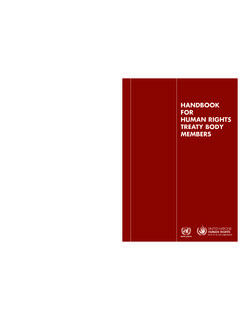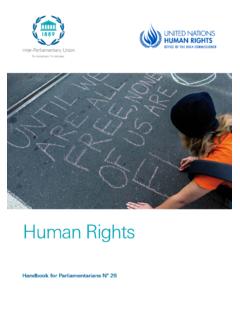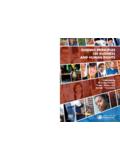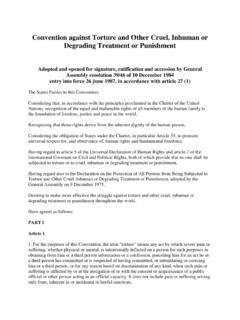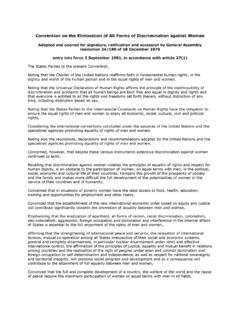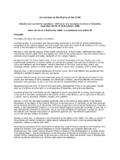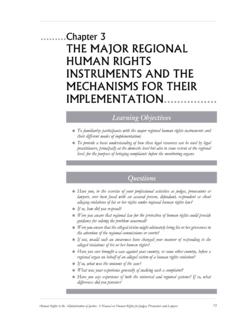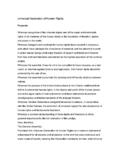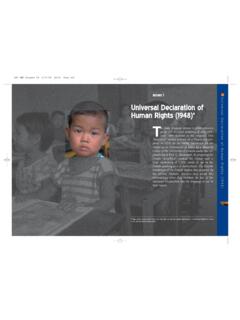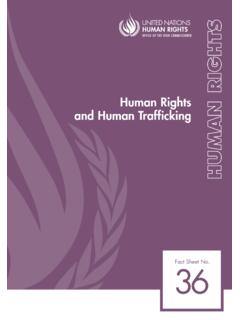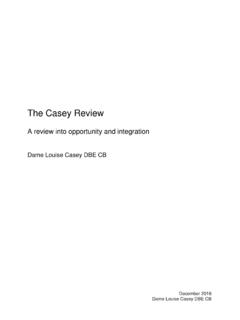Transcription of RACIAL DISCRIMINATION IN THE CONTEXT OF THE COVID …
1 1 RACIAL DISCRIMINATION IN THE CONTEXT OF THE COVID -19 CRISIS The COVID -19 crisis and its impacts are disproportionately affecting certain marginalised RACIAL , national or ethnic communities and population groups. The pandemic has highlighted and exposed underlying structural inequalities and fundamental problems in various areas of social, economic, civil and political life, and exacerbating racism and RACIAL DISCRIMINATION , which exist in many parts of the In addition to the devastating health consequences of COVID -19 for people of African descent and certain national or ethnic minorities, there has been a significant increase in RACIAL verbal abuse, harassment and violence in public spaces, particularly targeting people of Asian descent in the CONTEXT of the current crisis. The pandemic also put at risk the effective implementation of the 2030 Agenda, in particular its Sustainable Development Goal (SDG) 10 to reduce inequality within and among countries.
2 The General Assembly, in its first resolution related to COVID -19, emphasized the need for full respect for human rights, and stressed that there is no place for any form of DISCRIMINATION , racism and xenophobia in the response to the Under international human rights law, States must prohibit and eliminate RACIAL DISCRIMINATION in all its forms and guarantee the right of everyone, without distinction on the grounds of race, colour, descent, or national or ethnic States must also guarantee the right of everyone to equality before the law. Although some human rights can be restricted on public health grounds, these limitations must be provided for by law, necessary, proportionate and As governments around the world begin to re-open public life and ease restrictions and quarantines, a broad range of human rights issues and concerns are arising, which could lead to further RACIAL DISCRIMINATION or adverse impacts on RACIAL or ethnic communities and groups.
3 These frontier issues include vaccination development, testing access and protocols; data collection and retention; immunity passports ; surveillance and tracking tools; discriminatory treatment of survivors of the virus; and immigration policy and border control management. There are also growing concerns about economic livelihood and continued marginalisation of persons belonging to RACIAL and ethnic groups and communities in the spheres of employment, health, education, and housing. In order to effectively document and address manifestations of RACIAL DISCRIMINATION , there is an urgent need to ensure disaggregated data collection, in accordance with human rights norms, both during and after the COVID -19 crisis. 1. What is the impact of COVID -19 on the right to health of people of African descent, people of Asian descent, Roma and other marginalised groups?
4 The World Health Organization (WHO) has noted that the threat and experience of COVID -19 occurs differently for different groups. Marginalised and stigmatized groups have greater vulnerabilities and a disregard of this factor subjects them to a higher risk of infection and undermines the broader COVID -19 Persons belonging to RACIAL , ethnic and religious groups are among the main groups at risk, due to their lower socio-economic status and entrenched exclusion and DISCRIMINATION , making them particularly vulnerable to higher rates of infection and mortality and to unequal access to adequate medical Persons belonging to marginalised groups, including migrants, may HUMAN RIGHTS AT THE HEART OF RESPONSE TOPICS IN FOCUS RACIAL DISCRIMINATION 22 JUNE 2020 2 be more likely to be excluded from health care because of stigma or DISCRIMINATION , or due to a lack of resources.
5 Or official The COVID -19 pandemic has aggravated long-standing structural inequalities in terms of access to healthcare facilities, goods and services. This is contrary to the human rights obligation to protect the right to health for everyone,8 and to promote the access without DISCRIMINATION of individuals or groups of individuals who are victims of racism, RACIAL DISCRIMINATION , xenophobia and related intolerance to health People of African descent, people of Asian descent and Roma are doing worst in the midst of the pandemic. In addition, they represent a significant percentage of - frontline workers - the nursing personnel; health aides; care workers; grocery and delivery staff; bus and transport drivers, who are more exposed to the risk of contamination, and have been making up the large numbers of contaminations and deaths in the current pandemic.
6 Structural inequalities and racism are manifested in access to medicines and medical procedures not related to COVID -19, and are likely also to have had an impact in each aspect of diagnosis and treatment of COVID -19, beginning with who gets access to telemedicine, then whose symptoms are taken seriously and who gets first tested for COVID -19, leading next to who gets hospitalized, and then ultimately who gets personal protection/preventive means, respiratory devices in hospitals and home care. There are also serious concerns about the potential for RACIAL DISCRIMINATION in decision-making around testing of trial vaccines for COVID -19 and ultimately around who would have access to an eventual vaccine. At every stage of this process, the ability of people to seek care and participate in the decisions relating to their lives is affected by public health information, including whether information is available in minority languages.
7 The absence of testing data disaggregated by race or ethnicity obscures the ways this crisis affects RACIAL and ethnic groups. Where disaggregated data is available, stark RACIAL disparities are evident. For example, there are now a number of studies that document that people of African descent have higher infection and mortality In addition, their situation is aggravated by several underlying health conditions that enhance risk and vulnerability to the COVID -19 These underlying health conditions are often symptoms of prevalent structural racism. In some countries, people of Asian descent have been refused medical treatment and dental Roma communities are particularly especially vulnerable as in addition to unequal access to healthcare and treatment, they may not have access to information and preventive means, and some countries have restricted access to and from Roma neighbourhoods, as a measure to prevent the spread of Some recommended actions.
8 Ensure equal access to healthcare and eliminate any discriminatory practices against RACIAL or ethnic groups, including through initiating and implementing programmes and projects in the field of health for these communities, having in mind their disadvantaged Prioritize access to free or affordable testing, medications and needed procedures, such as ventilation, for those at higher risk, including members of RACIAL and ethnic groups who have been disproportionately affected by Make wider use of mobile clinics to reach out and deliver services directly to marginalised and vulnerable communities who may be cut off from access to health services. Distribute essential medical and preventive information in minority languages through digital and printing means. Involve communities and their representatives and associations, in designing and implementing health programmes and projects concerning RACIAL and ethnic groups.
9 3 Some promising practices: Some positive initiatives have included distribution of information in the Roma language, including through a dedicated website; requests to local authorities to make Traveller sites safer to allow self-isolation; allocation of financial resources for the provision of medical supplies and equipment in Roma Some countries have temporarily granted residency rights to all migrants and asylum-seekers in an irregular situation to give them full access to the country s healthcare as the outbreak escalates, thereby reducing the risks for wider public health. Others have made all coronavirus treatment free to In some countries, civil society organizations and local authorities are deploying mobile units staffed with doctors and cultural mediators to inform migrants and people, who are homeless or living in informal settlements, about coronavirus prevention, and to make medical examinations.
10 Some governments announced relief packages to provide free food and cash transfers to the poor, vulnerable, and marginalised populations, and special health insurance for healthcare workers combating OHCHR Regional Office for Central America, in coordination with indigenous women organizations and the Ministry of Health of Panama has facilitated access to relevant information on COVID -19 in seven official indigenous languages, through audio-visual materials and radio messages. The content includes prevention, symptomatology, and how and where to access healthcare. In Costa Rica, COVID -19 tests are available and provided free of charge for any person who may require it. People under quarantine receive adequate care in health facilities or regular follow-up in their respective domiciles.
